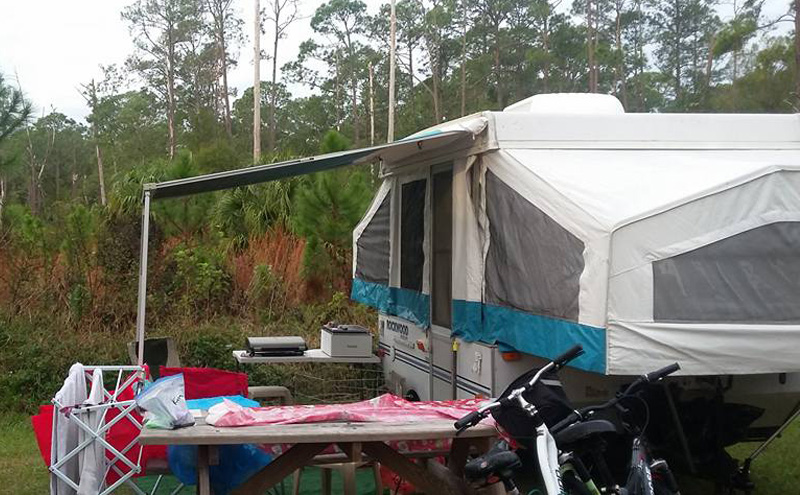As a beginner to camping, getting a pop up camper can be a great option to get started without making a large financial investment. This way you can get a feeling for the experience without the cost of a traditional RV.
The tent trailer offers you plenty of room, and when collapsed they only take up a little bit of space.
When looking at campers, a pop-up tent trailer may seem like a great investment. However, you should do your research before making any commitments. If you're unsure if a pop up is right for you, consider renting one first.
Outdoorsy is a great place to rent campers and RV's locally for the best price wherever you are. Click here to check their local inventory of tent trailers.
Here are 31 things you MUST know about pop-up tent trailers. This includes the pros, cons, and everything in between to help you make the best buying decision.
1. Most vehicles can tow a pop-up
One of the greatest benefits to getting a pop up camper is that they can be towed by almost any vehicle. Due to their light weight, you won't need too much power to pull it.
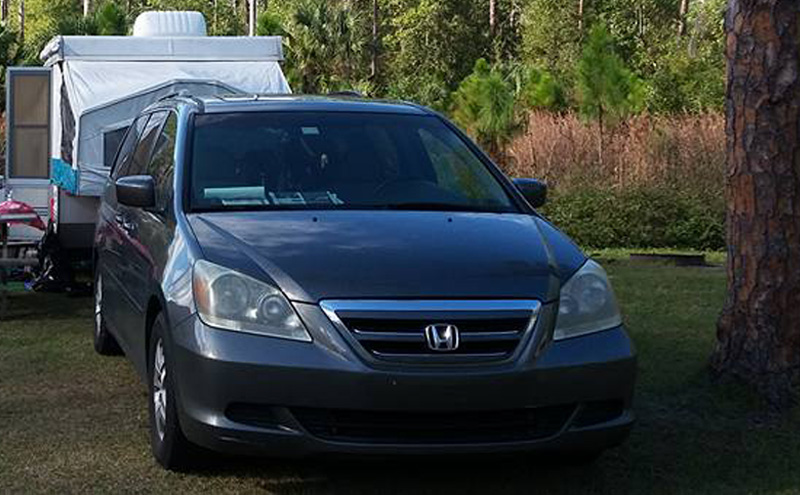
We were even able to tow our Rockwood Freedom with a 2007 Honda Odyssey. The ability to tow a tent trailer with most vehicles (other than small cars) will save you big time. That's extra money you no longer have to invest in a new truck or SUV, compared to that being necessary for towing other larger travel trailers and fifth wheels.
2. You can store it in your garage
Most tent trailers also pack down to such a small size, you'll be able to store it inside your garage. Now, not everyone will be able to do this based on size and available space, yet it's an incredible benefit if you can.
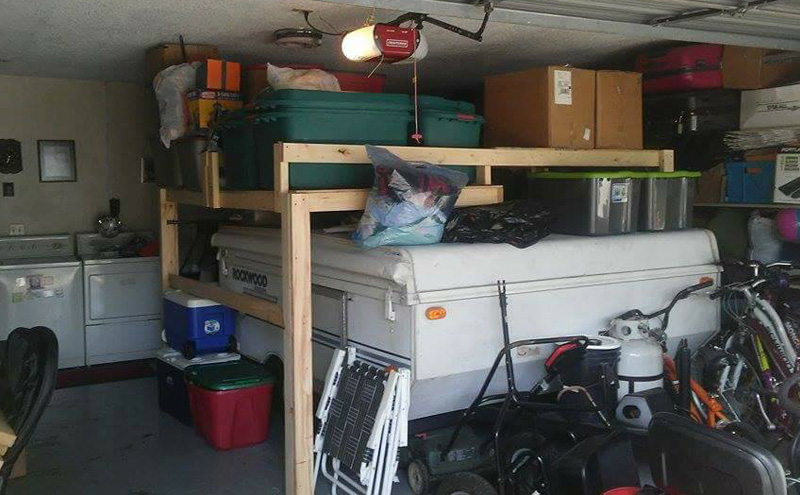
As you can see, we even built a storage rack out of wood to go over top of the camper when it's in the garage. The main reason for this is to keep the weight off of the trailer, without compromising storage space. You don't want to ruin your axles and hard top by storing a bunch of heavy camping gear on top of it when not in use.
You may be also thinking, well wouldn't you be giving up storage space for a car? Yes. However, the canvas material and hard siding on a tent trailer can get ruined much faster from outside weathering and mildew. By keeping your camper out of the elements, you'll be able to extend its lifespan by a whole lot.
3. They're more aerodynamic
When cruising down the highway, pop ups feature a much higher aerodynamic shape and design. Why is this important? In short, it saves you on fuel.
With a more streamline design, the air can flow much more free and not create as much wind resistance. When you see any other kind of RV, they're basically a giant box down the road. This absolutely kills gas millage. Compared to any other kind of camper (maybe other than teardrop trailers), pop ups will cost less money in gas tenfold.
4. Tent trailers are not as well insulated
Although tent trailers are rated "all-weather" with their thick canvas, it's not the same as a fully hard shell travel trailer. When heating and cooling, it's much easier for the air to escape through crevices in the canvas.
We always would make sure to use some foam blocks from the local hardware store to seal it in any open areas. However, this isn't a perfect solution.
5. Consider pop-ups the next level up from a tent
When looking into pop up campers, they're that next tier up from standard tent camping. We started out camping in a tent, and then upgraded to a pop up. These are the main benefits you get from going with a pop up vs tent camping:
- You're able to get up off the wet or cold ground, which helps a lot when sleeping.
- There's better security than a tent since you can "lock the door" (more on that later).
- You get power, heating, cooling, sink/water supply, wind and weather resistance.
- Much better experience (for most).
- Exponential gains.
6. Few pop-ups have a bathroom
One of the major concerns some have as a beginner camper is the bathroom. Most pop-ups do not have a built in shower or toilet inside. However if they do have one, this is what they'll look like:
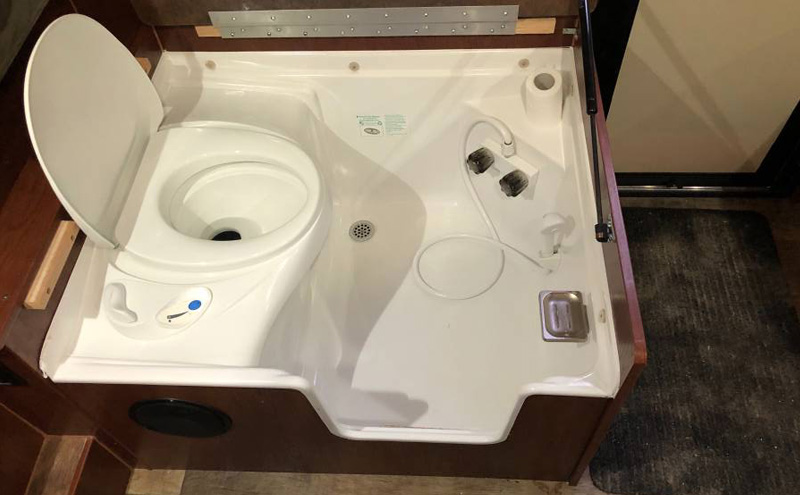
They're not the most private of bathrooms since you have to lift a shower curtain to cover the area for use. One of our friends had a bathroom in their pop up, and to be honest they used it more for storage space than anything. It's not anywhere near as convenient to use in comparison to other types of RV bathrooms with an actual door.
If your pop up does not have a built-in bathroom, then you'll need to choose campsites closer to public campground bathrooms.
Although, there is a benefit to this at the same time! This means no trips to the sewage or dump station line. Avoiding these lines can save you hours if you're trying to check out of a campground on a busy holiday weekend. Not to mention, you won't have to use gloves and mess with the stink of sewage.
However, if you do really need a bathroom in your pop up camper, you can also opt for a portable toilet. This porta potty by Camco works great.
Porta potties are excellent if you have girls or don't feel like walking all the way to the campground bathroom in the middle of the night.
They'll save you in those painful times when you really gotta go. I would highly recommend getting one if your pop up does not come with a toilet.
Not to mention, for cleaning you can also take them right into the bathroom and dump the holding tank into a regular toilet. That way, you can still avoid the massive lines at the campground's RV dump station.
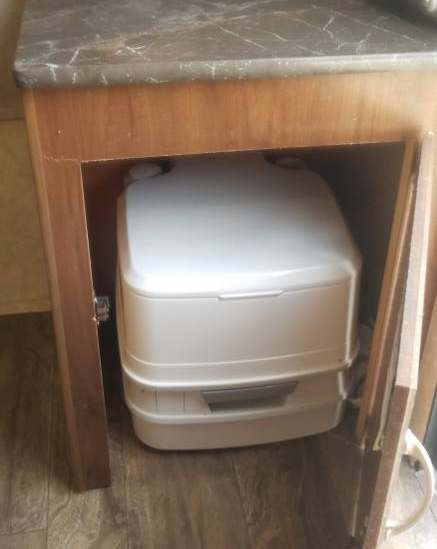
You can also keep your porta potty tucked away inside a cabinet when not in use for storage.
This allows them to not take up too much extra room while inside using your camper.
If you're curious about potential odor, as long as you keep the holding tank closed you won't smell anything.
7. You can get a pop-up for cheap
Did I mention you can find nice pop ups for under $10,000? Some smaller used ones can even go for around $2,500.
This has got to be the best part of owning a pop up. Your initial investment will be so much lower than any other RV. Not to mention, you also save money by not needing to buy a truck or SUV to tow it.
8. Compromise overall cost for better alternatives
You also have to consider the fact that you're compromising cost to better camper alternatives. Let's face it, in a pop up you have less conveniences than a larger and more expensive RV. However, you would be paying more for those benefits, so in turn you save money by going with a "starter" option.
Pop up campers do have their benefits, yet the camping experience is more work than it would be with another kind of RV.
9. Entry level and good first time RV
For beginners looking to get into camping, a pop up can be a great option. They're a low cost solution for getting an RV experience. It's that next step above traditional tent camping where you have more comforts. You have a lot lower investment into getting started with a pop up than other RVs.
10. Not for those less mechanically inclined
While tent trailers can be good for beginners, a pop up is not for those who are less mechanically inclined. There is a lot more setup involved with a pop up than other RVs and you'll need patience to get through it.
In addition, there's many specific tasks that must be done a certain way for the camper to have a safe setup. This includes setting up the door, cranking up the hard top, and sliding out the beds. Each of these tasks have multiple locks and mechanisms.
I'm not saying it's impossible to learn how to do it, it's just a bit more involved than other options out there.
11. Less secure than a hardened trailer
One factor some may be curious or nervous about is the overall security of the tent trailer design. While you do have a locking door, it's more to deter people that protect them from getting inside.
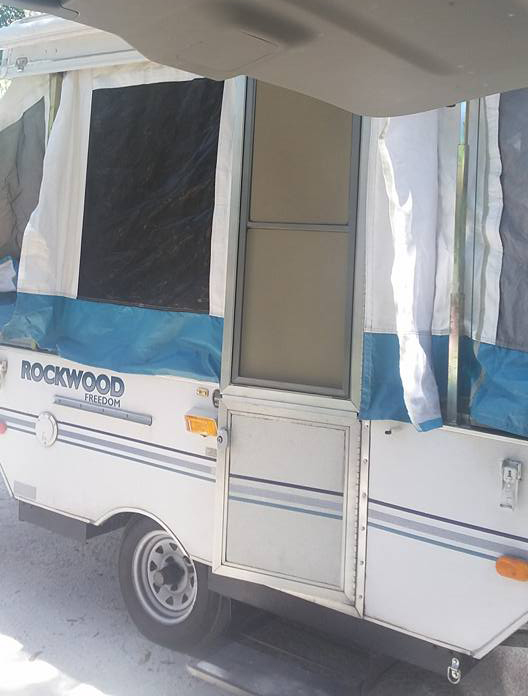
For example, if someone really wanted to get inside all they'd have to do it peel back the Velcro on the canvas.
Now to be honest this isn't really an issue at most campgrounds surrounded by other families.
However, for those inclined to worry about things like this, it's something to consider.
My best advice for this is to lock any valuables inside your vehicle when leaving your campsite. This way, you have much higher security with an alarm.
12. You need more vehicle space for storage
One downside to a pop up camper is that you won't be able to store all your camping supplies inside the trailer. You will have some cabinet storage, yet no where near as much as other RVs.
To compensate you''ll need more room inside the back of your vehicle to transport your camping gear.
If you're planning on towing your camper with a smaller vehicle or don't have enough room inside, you can also opt for a rooftop carrier.
The AmazonBasics Rooftop Cargo Carrier Bag works quite well in these scenarios.
We would use one on longer road trips to other states where we needed more storage.
Do keep in mind though that by choosing to use one of these bags does increase your total vehicle weight. This is an important factor for towing, and weight distribution for safe travels (more on this later).
13. Less space to store stuff in camper
Once again, this is something to consider since you will not be able to keep as much gear inside when storing and not using your camper. Most of our other camping gear would go inside bins and stay in the garage.
This can be less convenient and create additional headaches when preparing for a camping trip.
14. Longer loading and unloading time
Due to the less space inside the camper, there's also more stuff you have to load and unload every time you go camping. This adds a lot of time when arriving at a campsite.
In comparison to other RVs and travel trailers, they can back up, park, hook up a few lines and be done.
Instead with a pop up, it's a much more labor intensive setup with pulling bins out of your vehicle and into the camper.
15. Most have tighter usable living space
The inside of a pop up camper will have less overall living space than other RVs on average. This is not always the case, yet for most they'll be more narrow and tighter. As you can see inside this camper:
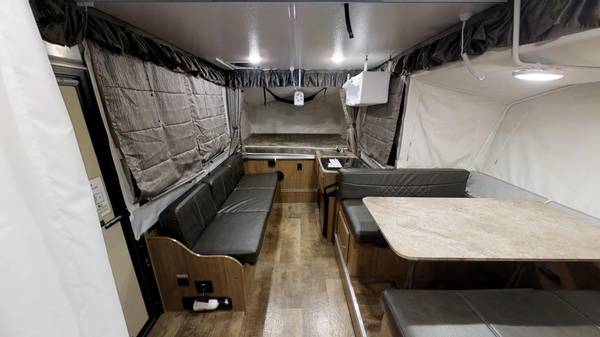
While there is more room with a pop out side in this camper, the walkway is not as wide as some other RVs. This can make navigating inside somewhat difficult when loaded with camping gear. This also impacts how many people you can fit inside.
I do not really find this too much of an issue as really all RVs are more narrow for a compact living space. However this is a factor to consider before buying a pop up tent trailer. It's okay to fit 4 to 5 people inside, yet it may not be the best option for those with larger families. In that case, you may want to consider a travel trailer vs a pop up.
16. Easier to park and back up
The benefit of having a smaller trailer is that it's much easier to park and backup. The overall length of a pop up is much lower than that of other RVs and campers. This makes the job to reverse and maneuver on smaller campsites much easier.
In addition, when a pop up is cranked down you can see over the top of it. This also helps when backing up and trying to look in the mirrors. Sometimes the AC unit can get in the way, yet it still helps a whole lot when the top is down.
17. Less ongoing maintenance
With any kind of trailer you'll have much less maintenance than driving RVs such as a class a, b, or c. That's because there's no engine or motor inside to decay and cause issues. The only maintenance you really have with a pop up camper are the wheels, axles, and canvas if it gets weathered (depending on how it's stored).
In general, there's less moving parts inside a pop up camper. With that, there's less things to break over time which gives you less headaches.
18. More fresh air
One of the nicest aspects to a tent trailer is that you can really open up all the walls. This allows you to bring in a ton of fresh air for a cross breeze when it's nice outside.
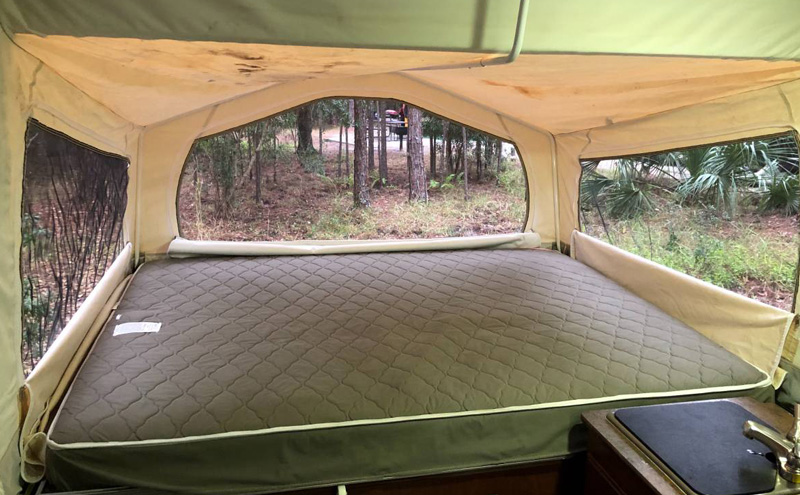
19. Feels more like camping
This goes right along with the fact that there's a lot more fresh air in a pop up. When you're inside a large RV with all the amenities, it can almost feel like a hotel. The whole point of camping for many is to get outdoors and be more in touch with nature.
With a pop up, you can get this experience of camping a whole lot more. The thin walls also allow for a lot more sounds from nature (for better or for worse).
20. It's okay to buy used
When shopping around for a pop up camper, you can find one used for a pretty good deal. As long as you take your time looking for a good value, you can find one that's not going to break down on you. I was with my family for the entire purchasing process, here's a few key things to look out for when buying a used pop up:
- Make sure the camper has a solid AC unit. (This is crucial if you plan on camping in Florida with a pop up in the hotter parts of the year).
- Verify the canvas has no rips, tears, or mildew.
- Check for crevices with any leaks.
- Negotiate with the seller for a better deal (if applicable).
To find a used pop up camper I'd recommend going through your local Craigslist listings, Facebook marketplace, Offer up, or Let go.
21. After rain, you'll need to air it out before closing
After a heavy rainstorm on a tent trailer, you will need to air out the canvas and awning before popping it back down. This is important to do in order to avoid water and moisture buildup, which causes mildew. It's an annoying step, yet crucial if you want your pop up to last you for a long time.
If it ever rained a lot over a camping trip, we would pop down the camper temporarily for the drive back home. Then, we would open it back up in our driveway to air it out over the next couple of days.
22. You'll want collapsible organizers
With a pop up camper, everything pops up and down. It helps if your organizers can do this too. With limited internal cabinet storage or space in general, you'll need some extra areas to tuck items away vertically.
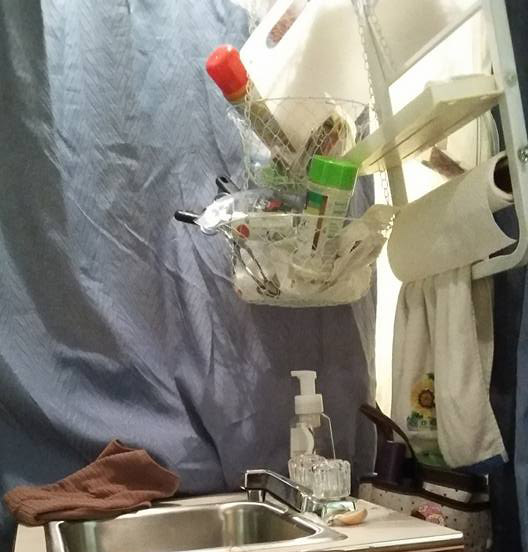
We use a portable towel rack in order to have a bathroom mirror and place to store our toothbrushes.
When closing up the camper, it folds right up into the ceiling of the hard top.
I have no idea where we found this originally, your best bet may be an RV specialty store.
Another great organizer we use is a collapsible towel rack. After taking a shower, this is the perfect spot to dry off large towels. They also work well to place hand towels after cooking food.
They're quite light, and fold right up for storage inside the camper when not in use. Then, it goes outside when on our campsite.
It's a must have for camping with a pop up, due to your limited space inside.
23. You'll want to cook outside if you can
A downside to most RVs is the lack of ventilation inside. In tent trailers, it can be even worse due to their close quarters. If you want a better cooking experience, your best option is to cook outside.
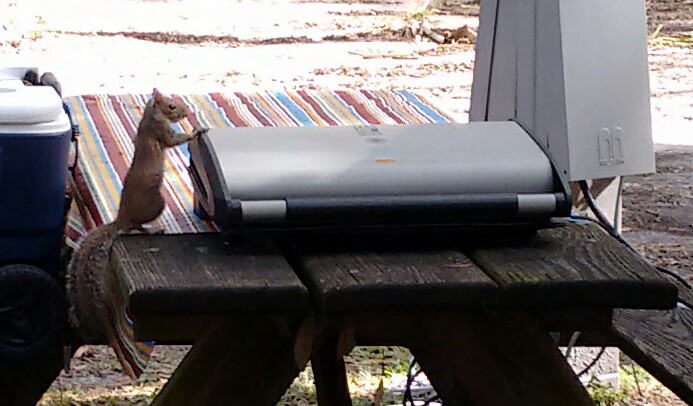
In addition to a standard propane fueled gas stove, our favorite camp cooking accessory for pop up campers is a George Foreman grill.
They plug right in for electrical power, and the grease empties into a pan you can rinse out.
We cook burgers, chicken, hot dogs, sandwiches, burritos, or really any other thing you can think of with this grill.
I would highly recommend getting a George Foreman grill as it makes cooking so much easier when camping. Not to mention they don't take up too much space either.
24. There's a lot of special hardware
An annoying aspect of any unique gear is that there's a lot of non standard special hardware. When doing repairs, finding and obtaining certain parts can be difficult or expensive. Many RV manufactures make them a way where you have to buy it through them for an arm and a leg.
Other times you may even need to go to a dealer or camper store for specific pieces.
This isn't a specific problem for pop up campers only, yet rather RVs in general and something to keep in mind.
25. Most pop-ups ride on one axle
This is something you won't notice to be an issue until you start driving on the interstate and towing the trailer behind your vehicle.
What is a single axle in the first place? You can see below there's only one set of tires:
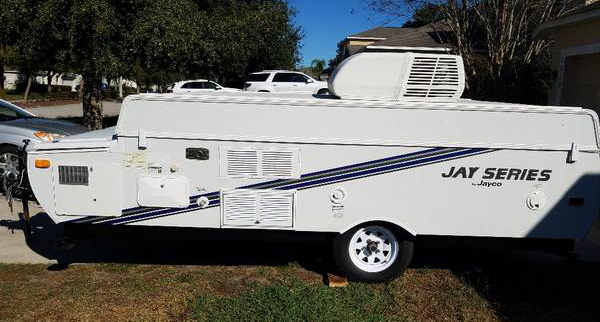
Unless you have a "mac daddy" pop up, you're likely to be towing a one axle camper. The downside is that with a single axle, you can never really get the right towing angle. Instead your camper sits like a seesaw, teetering up and down.
Your two options are as follows:
- High tongue = no fishtail at high speeds, yet more weight on the trailer suspension.
- Low tongue = has fishtail at high speeds, yet more weight on the vehicle suspension.
With either configuration, you really can't win. We always opt for a high tongue to avoid dangerous fishtailing on the highway. Yet, it really depends on personal preference as to how you want to do it. It's a factor that's somewhat unavoidable with a single axle trailer.
26. Large majority of pop-ups rely on pull-out beds
One major downside to a pop up is that many rely on pull out beds. Now not all of them do, yet you'll find that most do. The problem is that they:
- Are a pain if not setup right.
- Can be unsafe if supports are not put up in the correct way.
- The mattresses are somewhat thin.
- Could even tip the camper if the ground is loose (we did this once in the mud!).
The plus side to pull out beds is that they do open up your camper with a lot more space inside. Without them, you would have close to the same size as a teardrop trailer. As long as you're careful with pull out beds, than can be quite a benefit.
27. Awnings can be a pain
Awnings on most RVs will be a pain in your neck. I have banged my head on them so many times during setup it's not even funny (maybe a little bit).
To be honest awnings do help to keep your campsite more tidy and give a space to place all your camp chairs and other gear. Not to mention they'll keep the front area dry when it's raining.
However, it can be such a pain to line up all the slide outs that sometimes we don't even unzip and set it up. This makes having it somewhat of a waste at times.
28. Can be dangerous if not setup right
What goes up must come down... right? Well this would not be a great scenario inside a pop up camper. If you do not put the latches together in the correct way, you could have some canvas fall down on you in the middle of the night. Now, the hard tops do have a fail safe to prevent any major injuries, so not too much worry there.
29. More exposed to wildlife
Depending on where you plan on traveling, you may or may not run into this issue. If you are staying close to northern states and camping in bear country this could be a real problem with a pop up camper.
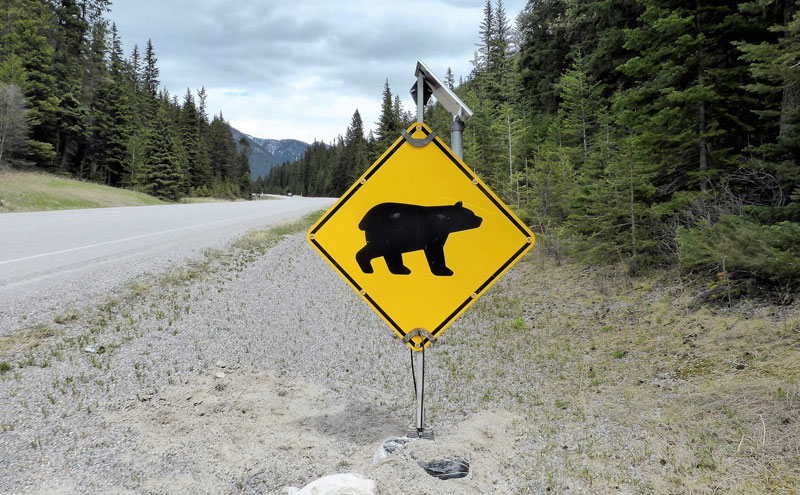
Due to the thinner canvas walls, you'll have to be a lot more careful traveling in bear country. We went camping in upstate New York and stayed where there were bears with our pop up. The campground's park rangers made sure to be clear on the food storage rules to prevent any incidents.
As long as you follow the rules for areas with certain wildlife you should be fine. Although, it is something to consider if you would feel safer in a hard shell RV.
30. Check and follow your vehicle's tow rating
If there's one thing you walk away with, DO NOT hook up any kind of trailer, to any kind of vehicle. Your vehicle must be able to handle the weight of the trailer you plan on towing with it.
If not, you could cause major engine or transmission issues and break down your vehicle. Despite what some salesmen may say at RV dealerships, just because your vehicle can tow 3,500 pounds, does not mean get a camper that weighs 3,500 pounds.
You actually don't even want to come close to your total tow rating.
Towing capacity is based on your total weight, including the people inside the vehicle and all of your camping gear as well. That means you need to leave plenty of wiggle room when planning to buy a camper trailer to accommodate for extra weight.
That's why it's much better to choose a trailer that's well below your tow rating limit. This way, you'll be sure your vehicle can tow it no problem.
Read this guide to understand towing capacity if you are unsure on how it works.
31. Trips are easier
One great benefit to having a pop up camper is the ability to go on more trips. Pop ups have a low barrier to entry. This allows you to travel somewhere and stay for a few nights at a campground for under $100. This often leads to more vacations, and the ability to create more memories.
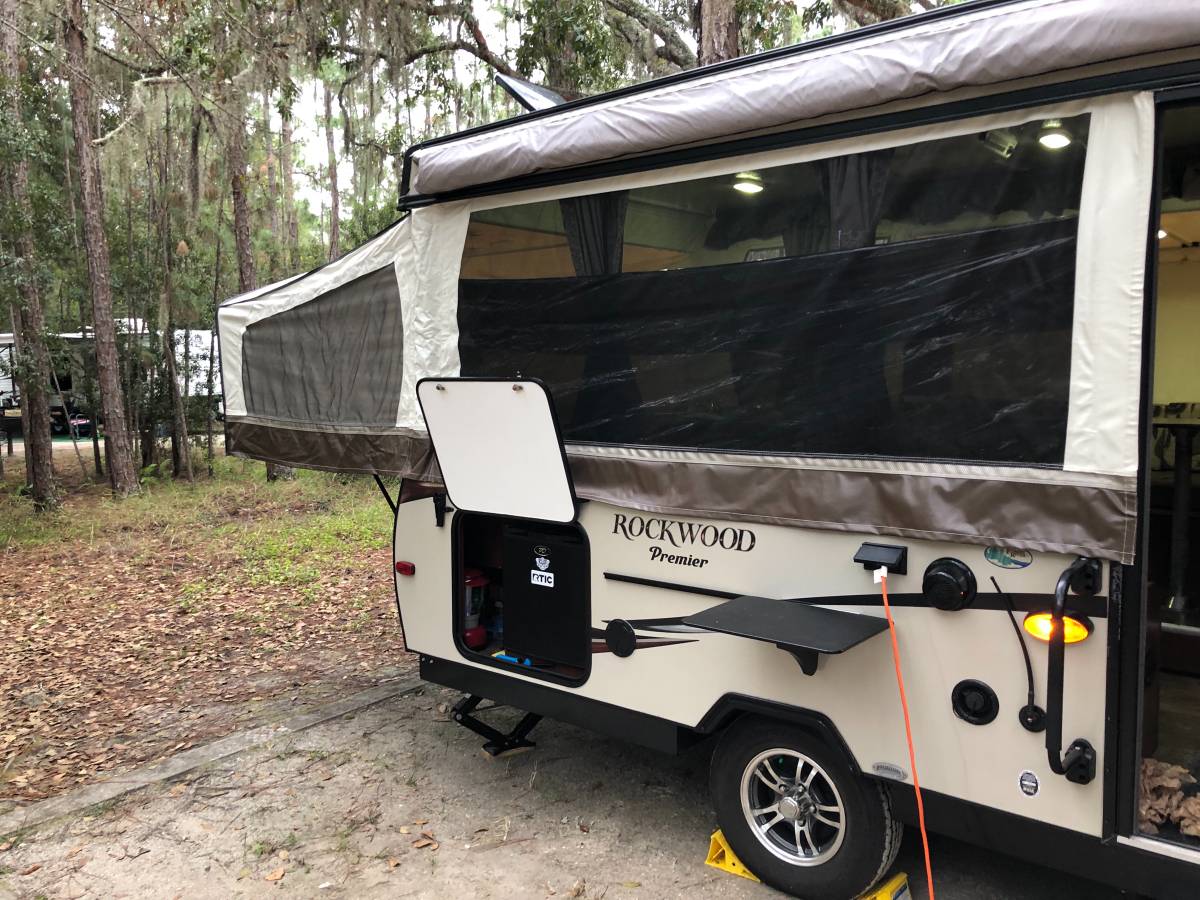
In addition, the tent trailer has a high level of versatility. With their more compact size, you can park them on most campsites. This helps a lot if you ever spring on a camping trip without much notice.
We've had a few times when our friends could not come along on a last minute trip with their fifth wheel. This was because their camper could not fit on any of the remaining available campsites.
To Conclude
A pop up camper is the perfect choice for someone looking to get a feel for an RV without as much of an investment. These trailers hitch right to most vehicles for a simple hook up.
With that said, they can be more time consuming to setup and use. You'll also have to deal with less amenities such as smaller beds, toilets, and kitchen spaces.
If you can get past all that, they can lead to happy travels without the stress of driving an RV around.
Happy camping!

